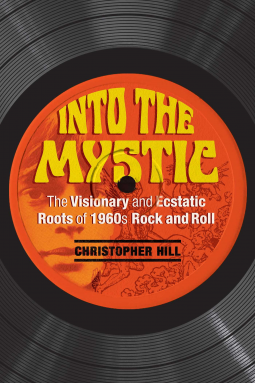
Into the Mystic
The Visionary and Ecstatic Roots of 1960s Rock and Roll
by Christopher Hill
This title was previously available on NetGalley and is now archived.
Send NetGalley books directly to your Kindle or Kindle app
1
To read on a Kindle or Kindle app, please add kindle@netgalley.com as an approved email address to receive files in your Amazon account. Click here for step-by-step instructions.
2
Also find your Kindle email address within your Amazon account, and enter it here.
Pub Date Sep 12 2017 | Archive Date Jul 01 2017
Inner Traditions | Park Street Press
Description
• Examines the visionary, spiritual, and mystical influences on the Grateful Dead, the Beatles, the Rolling Stones, Bob Dylan, Van Morrison, the Incredible String Band, the Left Banke, Lou Reed and the Velvet Underground, and others
• Shows how the British Invasion acted as the “detonator” to explode visionary music into the mainstream
• Explains how 1960s rock and roll music transformed consciousness on both the individual and collective levels
The 1960s were a time of huge transformation, sustained and amplified by the music of that era: Rock and Roll. During the 19th and 20th centuries visionary and esoteric spiritual traditions influenced first literature, then film. In the 1960s they entered the realm of popular music, catalyzing the ecstatic experiences that empowered a generation.
Exploring how 1960s rock and roll music became a school of visionary art, Christopher Hill shows how music raised consciousness on both the individual and collective levels to bring about a transformation of the planet. The author traces how rock and roll rose from the sacred music of the African Diaspora, harnessing its ecstatic power for evoking spiritual experiences through music. He shows how the British Invasion, beginning with the Beatles in the early 1960s, acted as the “detonator” to explode visionary music into the mainstream. He explains how 60s rock and roll made a direct appeal to the imaginations of young people, giving them a larger set of reference points around which to understand life. Exploring the sources 1960s musicians drew upon to evoke the initiatory experience, he reveals the influence of European folk traditions, medieval Troubadours, and a lost American history of ecstatic politics and shows how a revival of the ancient use of psychedelic substances was the strongest agent of change, causing the ecstatic, mythic, and sacred to enter the consciousness of a generation.
The author examines the mythic narratives that underscored the work of the Grateful Dead, the French symbolist poets who inspired Bob Dylan, the hallucinatory England of the Beatles’ Sgt. Pepper, the tale of the Rolling Stones and the Lord of Misrule, Van Morrison’s astral journeys, and the dark mysticism of Lou Reed and the Velvet Underground. Evoking the visionary and apocalyptic atmosphere in which the music of the 1960s was received, the author helps each of us to better understand this transformative era and its mystical roots.
Available Editions
| EDITION | Other Format |
| ISBN | 9781620556429 |
| PRICE | $16.95 (USD) |
| PAGES | 304 |
Average rating from 2 members
Featured Reviews
This is a wonderful book for music and history lovers. I started reading it and couldn't put it down!
 Beth B, Reviewer
Beth B, Reviewer
Wow, what a great book. It reads like a high-level, romantic and lyrically-written primer on all the varying forces that have shaped human history (migration, westward expansion and the search for paradise; empirism, colonialism, and fights for freedom; the horrors of slavery and the communities and music that came of it; wars, assassinations, and the periods of confused, frightened rigidity in between; religion, myths and folklore) and therefore shaped the human desire for the ecstatic, the momentary freedom of song and dance, the glimpse of the great beyond.
At points, Hill gets a bit too far into the weeds - the lengthy (multi-page) description of the inspiration behind "Walk Away Renee" and it's correlation with Dante's Divine Comedy, for example - and loses the thread and the reader. But for the most part, this book is brilliant.



